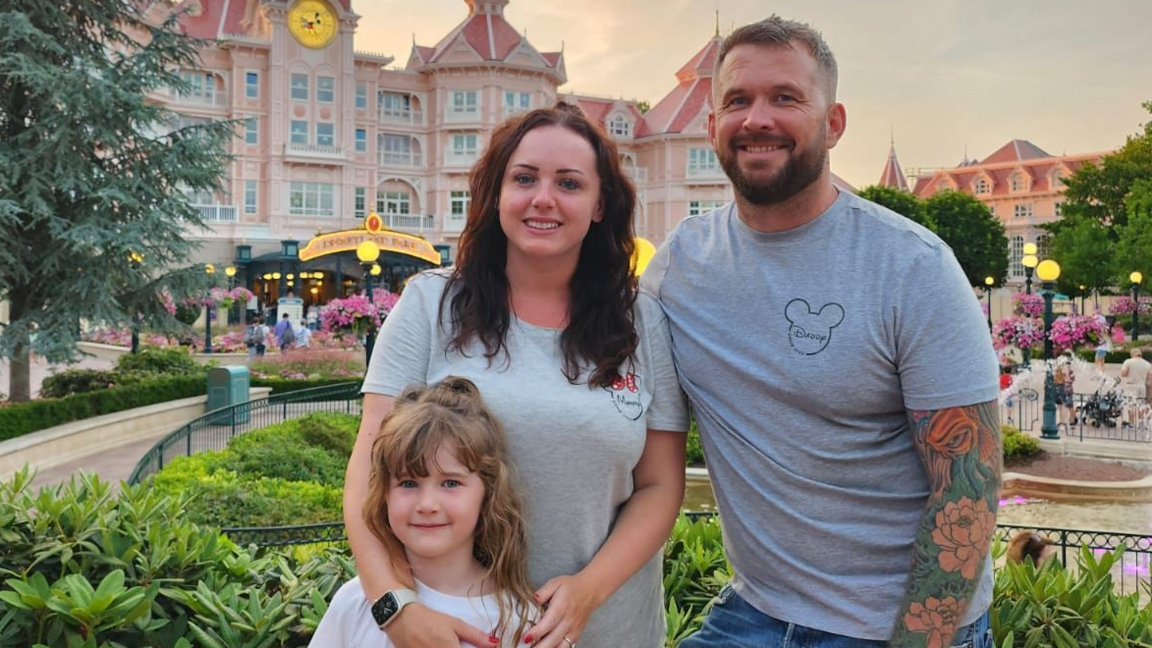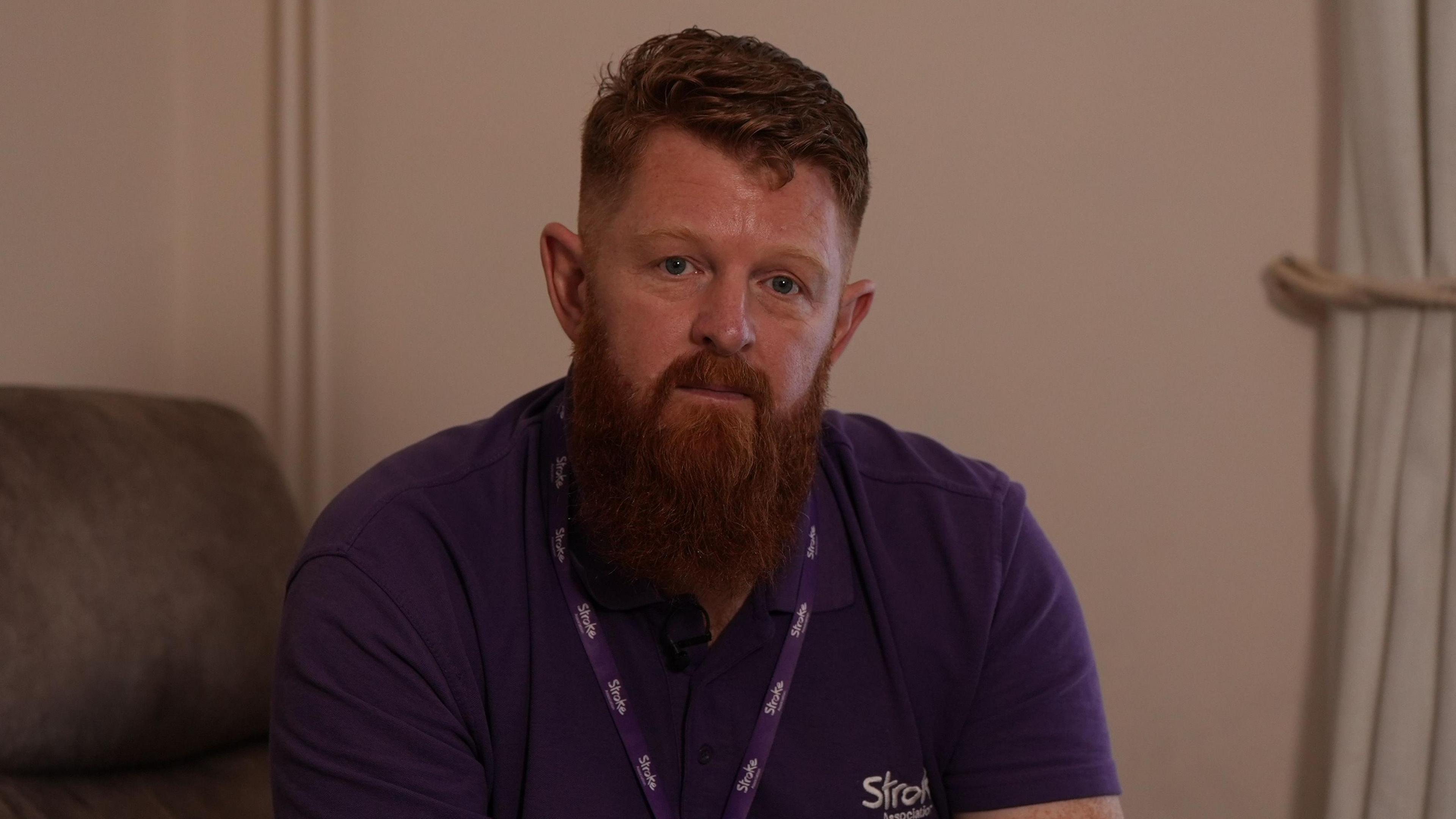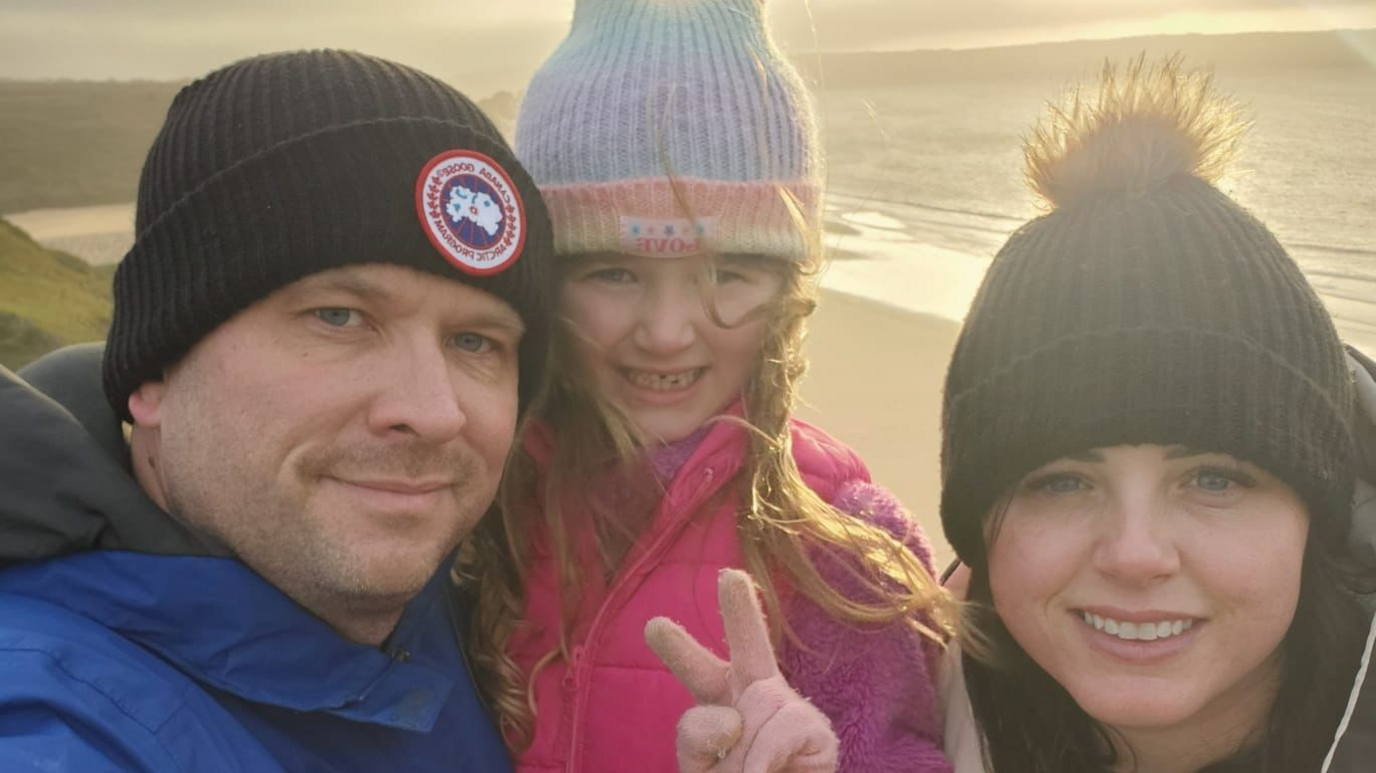I knew I could have a stroke, but not at 31

Angharad Dennis enjoyed holidays with her family before a stroke left her unable to walk unaided
- Published
Angharad Dennis knew the signs of a stroke, external because her grandmother experienced them, and having migraines made her wonder if she too might be more at risk.
But she never expected to have one just two days before she turned 32.
After her stroke in March, Ms Dennis also said she felt upset when relying on her young daughter for help, including putting her socks on.
"That’s not something I expect my six-year-old to have to do. I help put her socks on," said Ms Dennis, from Swansea.
She said she has found it useful to speak with others who have had similar experiences, and research from the charity Stroke Association suggests talking to others is for many an important part of their recovery.
Angharad Dennis says she now has a new outlook on life
Ms Dennis said she has often struggled to explain to her daughter what happened.
“When she falls over, she gets a plaster. How can I explain you can’t put a plaster on your brain?” she said.
Support has come from Dave Jones, who faced a similar challenge seven years ago, having a stroke six months after becoming a father, and is now a peer support coordinator for the Stroke Association.
“Dave was able to tell me the strategies he's put in place with his son that I was then able to take inspiration from,” Ms Dennis said.
Speaking of her stroke, she said "there was nothing that indicated that something so traumatic and big could happen at that point in my life".
“We got married in the November. Life wasn’t meant to be me being unwell – we had plans," she said.
She added that she got upset in hospital, particularly when thinking about her daughter, Cari, but that things got more difficult when she got home.
The former office manager does her best to focus on the achievements – including walking from the car to the school gate without a crutch - but the adjustments have not always been easy.
“Watching somebody else pick her up and physically take her to school - that was hard. That should have been me," she said.
Survivor calls for more support after stroke at 20
- Published8 June 2023
Queen guitarist Brian May suffers minor stroke
- Published4 September 2024
AI trousers helping stroke patient to walk
- Published15 August 2023
How common are strokes?
According to the charity Stroke Association, about 100,000 people have a stroke each year in the UK - about one every five minutes.
While more than 88,000 people survive these each year, the charity said this is just the start of a "long and traumatic battle" to finding their "way back to life".
The charity's research found that half of stroke survivors felt depressed during recovery, with 14% experiencing suicidal thoughts.
However, it found that talking to others affected by stroke was the single most important part of survivors' recovery.
Mr Jones can empathise with Ms Dennis' situation. In 2017 he was a fit and healthy 36-year-old with a newborn, but two strokes in the space of a year prompted a major adjustment.
He said he initially focused on the things he could not do, but with peer support started to change his mindset.
"You start to focus on, 'I may be able to do this, let’s give it a try'.”
He also picked up tips on managing his emotions from fellow stroke survivors.
Among the groups he supports are those aimed at men under 70, the youngest of who was 26 when he joined.
“One of the gents has said on many occasions if he wasn’t in the group he wouldn’t be here now – the group has saved his life.”

Dave Jones was told he was unlikely to work again after his stroke, but now uses his own experience to support other stroke survivors
Katie Chappelle, associate director of the Stroke Association, said in Wales about 7,000 people each year will have a stroke, and there are about 70,000 stroke survivors.
“It could leave them with anything from physical disabilities to communication problems, to mental health issues, and quite common is huge fatigue,” she said, adding that stroke services are struggling due to a lack of capacity.
“For a lot of stroke survivors, the community is where they really start to recover and make their progress, because once they come out of hospital, it's the start of a long journey to recovery," she said, adding that there are plans from the Welsh government, external to reconfigure stroke services.
"If you can get people on the right pathway, giving them what they need at the right time, then you can really improve people's outcomes," she said.

Angharad Dennis said she now has a greater appreciation for the time she spends with her six year old daughter Cari and husband, Joe.
Ms Dennis said that despite the challenges, her stroke has changed her perspective on life's priorities.
“Before I’d come home from work at five o'clock every evening, really stressed and just wanted some space."
Now she said she "can't wait" for her daughter to get home from school, and that she now engages with her more.
"I thought earning loads of money, being able to provide holidays and the best Christmases was the way forward. But it's not.
“All she wanted was my time, and I feel like that realisation wouldn't have come if such a life event hadn’t have happened."
How to spot the signs of a stroke
If you suspect that you or someone else are having a stroke, call emergency services - 999 in the UK - immediately and ask for an ambulance.
The main symptoms of stroke can be remembered with the word FAST:
Face - drooping
Arms - unable to lift both and keep them there
Speech - slurred, garbled or unresponsive
Time - dial 999 immediately
- Published20 August 2024
